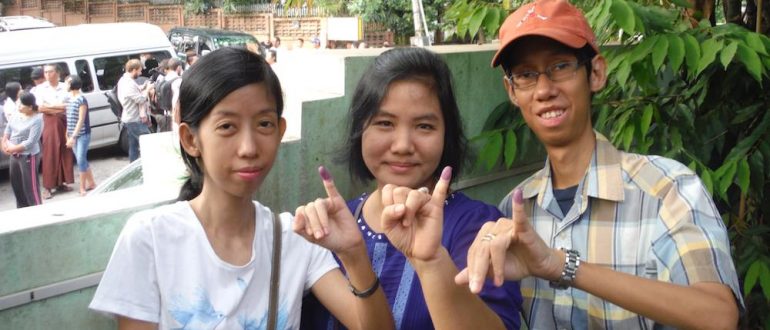
Elections in Myanmar – Right in the Middle as an Observer in Yangon
The local polling station in Yangon opened its doors promptly at sunrise, at 6 a.m. Over 33 million voters were called to vote on 8 November 2015 in Myanmar (Birma) in South-East Asia. In the run up, both the locals and international observers hoped that these were to be the first free and fair elections for 25 years. Interest in the result was equally high. For the first time in the history of the country, the government had allowed national and international observers from the EU and the USA, of which I was one, as part of the delegation from the Friedrich Naumann Foundation for Freedom.
The day started at around 5 a.m. with the journey to the first polling station in a school. It was impressive to see that everything was ideally prepared so early and the polling clerks sat at their seats, waiting for the start of voting. The first 30 voters were outside the school half an hour before the start of voting – a queue that would increase to a good 50 or 60 people by 6 a.m.
Then we went to a primary school acting as a polling station, where Aung San Suu Kyi, just called “the lady” or even “mother of the nation” was to vote. The school was quite besieged by media representatives, which made access difficult for the “normal” voters at this polling station. The opposition leader was driven up to the entrance at 8.45 a.m., gave no statements and drove away from the polling station again after just a few minutes.
After this polling station, probably the most closely observed internationally, we went to another school. In the bright midday sun, almost 300 people stood in a queue in the schoolyard in front of the polling station to be able to cast their votes. Voters leaving the polling station spoke of waiting times of around two hours. But they were happy to have voted and proudly showed their little fingers, marked with blue ink, indicating that they had already cast their votes. These long queues were no exception. Voter participation was equally high at around 80 percent.
The polling stations visited met the international requirements for free and fair elections. There was free access, a sufficient number of ballot papers and enough cabins so people could vote in private. To observe the counting of the votes, we returned to the first polling station at 4 p.m., where there was a power cut directly at the start. The votes were counted after the generator was started up. The National League for Democracy (NLD), the party of Aung San Suu Kyi, was clearly in front.
In the runup, a clear victory by the opposition party was expected, which won in the last free elections in 1990. A crowd of people celebrated this clear victory outside the NLD headquarters. However, the winner of the Nobel Peace Prize will not become President, as her sons are British citizens and the constitution thus excludes her from office. But it can be assumed that Suu Kyi will determine the next government and may possibly take on the very influential office of parliamentary Speaker. So far, all of this looks like a wellordered transfer of power and recognition of the election result by the military, which under the constitution continues to receive 25 percent of the seats in parliament. We must hope that the country will continue to tread this positive path, which itself introduced the military in 2010. The presidential elections will take place probably in February 2016.
This article is part of CISS’s cooperation with the Diplomatic Magazine and was published there first in the .
